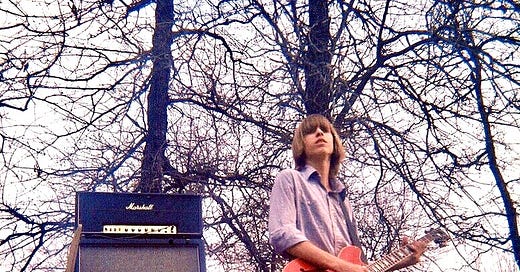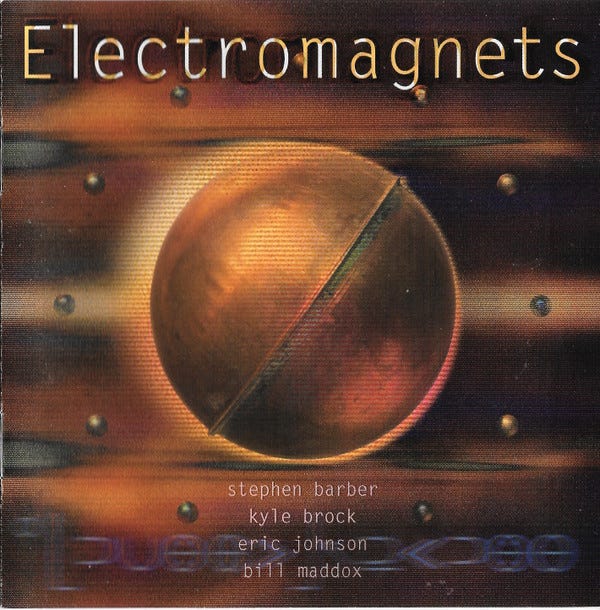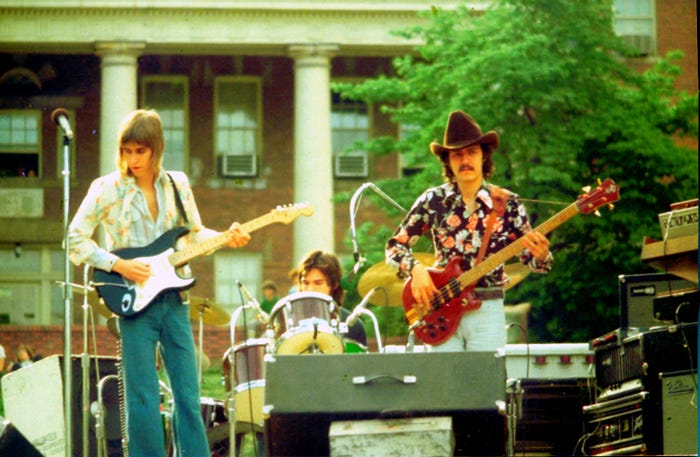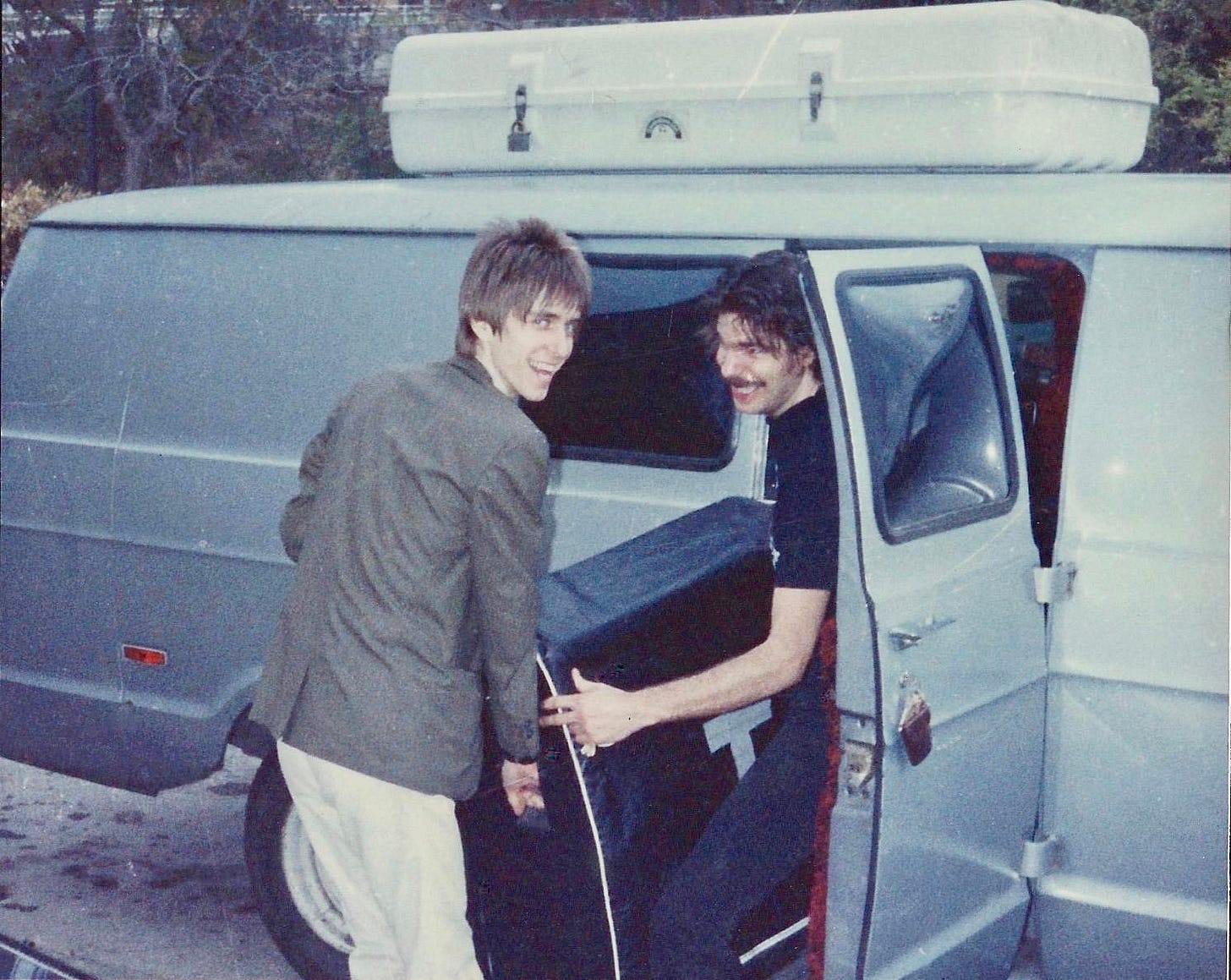Magnetic: Eric Johnson meets the boys from Abilene
The Electromagnets brought jazz-rock fusion to Austin in 1973

We all know about how the influx of musicians from Lubbock- Jesse Taylor, Joe Ely, Angela Strehli, all the Hancocks, Jimmie Gilmore, John X. Reed, Bob Livingston, Kimmie Rhodes, T.J. McFarland and so on, have enriched our musical way of life in the River City.
But let’s not forget the Great Abilene Migration of 1971, when two groups of musicians, who’d known each other since childhood, took that four-hour drive to Austin and never looked back. Those bands- Sundance and Cadillac- didn’t get record deals or headline at the Armadillo, but its members, including the Neece brothers, Tim and Murray, Stephen Grisham Barber, Bill Maddox, Keith Landers, David Baldry, Lee Pence, and Noel Kelton, plus soundman Richard Vannoy, went on to have a great impact on the Austin music scene.
Sundance drummer Tim Neece opened the Rockola record store on W. 24th St. and managed a cover band called Good Question, which would find greater success as Christopher Cross, necessitating a move to L.A. Managing Charlie Sexton, who signed with MCA as a 17-year-old in ‘84, eventually brought Neece back to Austin, where he switched from managing artists to running concert venues. In ‘96 Neece was hired by Tim O’Connor’s Direct Events (Backyard, Austin Music Hall, La Zona Rosa), then he helmed the Bass Concert Hall for seven years, and was the first general manager of ACL Live at Moody Theater.
His Sundance bandmate David Baldry worked at Strait Music for 15 years before opening Musicmakers at 517 S. Lamar in 1989.
The 1972 wreckage of Cadillac resulted in two quite different followups. The more vocally-gifted Landers and Kelton came up with Johnny Dee and the Rocket 88’s, a popular oldies band on the lucrative private party circuit for four decades.
After dabbling with a piano/drums prog duo called AUSSENHOROWITZ, drummer Maddox and keyboardist Barber, joined by another Abilenian, bassist Kyle Brock, co-founded the Electromagnets, the first great jazz-rock fusion band in town, in 1973.
“Billy Maddox was the gorilla glue that kept it all together since the Abilene days,” said Barber. The drummer’s father, a dentist by day, played Big Band dance music on weekends with his Ray Maddox Orchestra. “Billy would sit in. He could play just about every instrument and was always pushing us to be our best.” Maddox could play drums with one hand and a keyboard with the other.
One day they went to a rehearsal space on Crady Bond’s Hill On the Moon compound, and jammed with a recent Holy Cross High School graduate named Eric Johnson. “We loved Frank Zappa and wanted to have a guitar in the band,” recalled Barber, “but to say Eric blew us away is an understatement.”
The son of a Hyde Park anesthesiologist with a diverse record collection, Eric Johnson’s first instrument was the piano, which he mastered as a child. He got his first guitar at 11 and had his first band Sounds of Life at 13. At 15, he was recruited to join Mariani, whose drummer Vince Mariani had put out a couple drum instrumentals a la Sandy Nelson on Bill Josey’s Sonobeat label in 1969. In his Eric Clapton/Peter Green phase, Johnson played his Gibson 335 all over the Mariani album Perpetuum Mobile the next year. But after Josey shopped it to every major label and had no takers, Sonobeat put out only a 45.

Mariani opened a memorable Deep Purple concert in San Antonio in 1970, when they were asked to play an additional set by the promoter because guitarist Ritchie Blackmore was sick and being attended to by a doctor. “We’d already played every song we knew, so we just got back out there and jammed for an hour,” recalled singer Podolnick. The music made up on the spot, with improvised lyrics, received a standing ovation. But then there was bad news from the promoter. Blackmore was too ill to go on. A kid who said he knew all the songs on guitar was plucked from the audience to stand in for Deep Purple’s guitar legend. His name was Chris Geppert AKA Christopher Cross.
The likes of Emerson Lake & Palmer and Yes were replaced as models in the adventurous rock scene by Chick Corea’s Return to Forever, Weather Report, and Mahavishu Orchestra. There was a new, mind-blowing “jazz fusion” scene in Austin, including Tomas Ramirez and Jazzmanian Devils and 47 Times Its Own Weight, but when E. J. joined the Abilene gang in late ‘73, the Electromagnets went to the top of the class. They sounded like Jeff Beck’s Blow by Blow, but that groundbreaking jazz-fusion LP wouldn’t come out for another year.
“We were wondering what’s with these Abilene guys,” said Podolnick, who went to Holy Cross two years ahead of Johnson. “They were intense. Eric had found these really, really strong players.” Zappa was a fan, calling Electromagnets, “the Mahavishnu Orchestra if they had a sense of humor.” The Magnets often played the Bonanza theme song and cartoon music from the ‘30s to go with their full-on jazz-rock liftoff.
The band went into Odyssey Sound on W. Sixth in the summer of ‘74 and made an LP of originals with their manager Park Street producing. “It was well-received,” said Barber. The Magnets went from smaller clubs like Castle Creek and Soap Creek to larger venues like Mother Earth on North Lamar and the Armadillo.
On the road they were sometimes too far out for the crowd. One night in Huntsville the manager timidly approached the stage after the first song with the band’s pay in an envelope. “Thanks for coming, but we’re gonna go with the jukebox from here on.”
Johnson’s star power was so obvious that no one was surprised when the Electromagnets changed their name to “Eric Johnson” in 1976. Maddox and Brock continued as the rhythm section, while Barber moved to New York to study under a Julliard master. He rejoined Johnson’s touring band in the ‘90s, but is best known today as a classical composer and arranger.
Bill Maddox has an interesting footnote in Austin music history. We all know the Violators became Austin’s first punk band when they played Raul’s in early 1978. The headliner that night was Project Terror, with Maddox playing guitar and singing, and Glenn Fukunaga on bass. Kyle Brock, meanwhile, played in the Bodysnatchers, the first Raul’s band to release a record, though they broke up shortly after. The Abilene guys were always open to new ideas.
Maddox was also a gearhead and studied at the Southwest School of Electronics. In January 1984, he got a job on the three-man manufacturing staff of PC’s Limited, which became Dell Computer later that year. One of the first “Dellionaires,” Maddox eventually cashed out, got sober and helped other alcoholics recover. He kept his hand in music, rejoining Johnson on the Alien Love Child side-project in 1994, and playing with the Fabulous Chevelles, a party band led by former Cadillac booking agent Charlie Hatchett.
Maddox played the Abilene Country Club with the Chevelles on Dec. 21, 2010 and noted during dinner that this was also the site of his first paying gig, playing drums for his Dad’s group at age 13. It ended up being the last place he played.
After visiting Landers regularly in the Scenic Brook neighborhood in West Austin, Maddox bought a house whose backyard abutted the Landers property. The pair had been best friends since elementary school and now they would grow old together.
But random, unspeakable tragedy struck the Abilene brotherhood on December 27, 2010 when Maddox was murdered by a deranged neighbor, a jogger off his meds who threw a rock through the glass front door and entered the house. He fought with Maddox, whose wife called 9-1-1 and got the pistol, shooting the intruder. But the 63-year-old neighbor was able to get the gun away and shot Bill Maddox. The killer died three days later of a head injury suffered when a wounded Maddox threw him through a wall to protect his wife. Maddox was 57, and 24 years sober.
More grief came 10 months later when Landers passed away from kidney failure. He was 60.
“There’s not a day goes by I don’t think of Billy and Keith,” said Barber, speaking for the entire Abilene gang, who lived and breathed music in their boring hometown, then took their talent to an Austin scene that had not yet seen their likes.









Oh, Jesus. I had wondered what became of Bill Maddox when you posted a reply to one of my comments that he was shot by a neighbor. Now I see the full story. Covered Bill with Eric Johnson and Project Terror. That latter band had Tony Dukes on bass and Stevie Wilson on drums. They have also passed on to the Great Beyond. Tony was a story in himself. Kid from Paint Rock TX who sold the Eagles Don Felder the '59 Les Paul he played for the solo on "Hotel California." The thread of connections in Texas music is a long one.